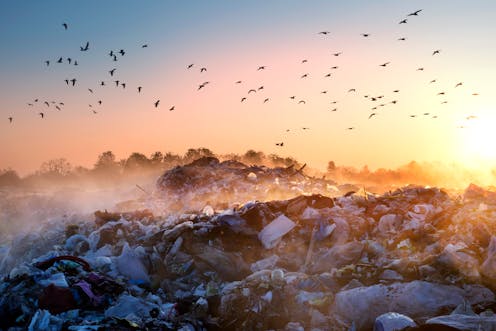Play all audios:
September 22, 2021 Ian Williams, _University of Southampton_ A high court judge said the Environment Agency was failing to fulfil its legal duty to protect the public. September 22, 2021
Laura Corlin, _Tufts University_ It’s the World Health Organization’s first update of global air quality guidelines since 2005. We know far more today about the serious risks these
pollutants pose to human health. November 2, 2021 Drew Shindell, _Duke University_ A large amount of methane emissions come from natural gas infrastructure and landfills – all problems
companies know how to fix. September 13, 2021 Xiaoming Xu, _University of Illinois at Urbana-Champaign_ and Atul Jain, _University of Illinois at Urbana-Champaign_ A new study provides a
detailed way to calculate the climate impact of food production, which could lead to more sustainable farming policies and methods. August 13, 2021 Tom Baxter, _University of Aberdeen_
Hydrogen fuel derived from natural gas may be worse for the climate than the fossil fuel even with carbon capture and storage. July 22, 2021 Sylvia G. Dee, _Rice University_ The results of
Foote’s simple experiments were confirmed through hundreds of tests by scientists in the US and Europe. It happened more than a century ago. June 15, 2021 Myles Allen, _University of Oxford_
If the G7 is serious about stopping global warming, it could start by acknowledging who and what is causing it. June 1, 2021 Katsumasa Tanaka, _Université Paris-Saclay_; Johannes Morfeldt,
_Chalmers University of Technology_, and Olivier Boucher, _Sorbonne Université_ A new study shows how we can meet the goals of the Paris Agreement by changing the value of different
greenhouse gases over time. May 17, 2021 Jemma Wadham, _University of Bristol_ Glaciers aren’t sterile wastelands – they’re chock-full of microscopic life. May 6, 2021 Drew Shindell, _Duke
University_ The lead author of a new UN report on methane explains the findings and how oil and gas companies could be making money and saving the climate at the same time. April 28, 2021
Lisa Schulte Moore, _Iowa State University_ Farmers can help slow climate change by mixing native grasses into croplands, restoring wetlands and raising perennial crops. These strategies
also conserve soil and water and build new markets. April 9, 2021 Luke Jeffrey, _Southern Cross University_; Damien Maher, _Southern Cross University_, and Scott G Johnston, _Southern Cross
University_ Scientists are learning trees can emit methane, which could be a big problem for global warming. But a world-first discovery of methane-eating bacteria in paperbark can help
moderate this. April 5, 2021 Judith Rosentreter, _Yale University_; Alberto Borges, _Université de Liège_; Ben Poulter, _NASA_, and Bradley Eyre, _Southern Cross University_ Scientists
previously underestimated aquatic methane emissions. We must use this new information to stop methane derailing our attempts to stabilise the Earth’s temperature. March 17, 2021 Ermias
Kebreab, _University of California, Davis_ and Breanna Roque, _University of California, Davis_ Cow burps and farts are no joke – they’re a big factor in climate change. A new study shows
that daily seaweed supplements could tame this major methane source while saving ranchers money. February 8, 2021 Rachelle Meyer, _The University of Melbourne_ No-one says reducing emissions
from the agriculture sector will be easy. But it must be done, or farmers will suffer the most. November 17, 2020 Madeline Taylor, _University of Sydney_ and Susan M Park, _University of
Sydney_ Despite the government spruiking a ‘gas-led economic recovery’, natural gas is clearly on the way out. It’s time for a serious rethink on the way many Australians cook and heat our
homes. November 17, 2020 Kliti Grice, _Curtin University_ and Calum Peter Fox, _Curtin University_ The end-Triassic mass extinction was a cataclysm for the world’s prehistoric species,
killed off by volcanoes that altered Earth’s seas and skies. But new research shows it didn’t happen when we thought. November 12, 2020 Chris Allen, _Queen's University Belfast_ and
Niall English, _University College Dublin_ If so, then the possibility of planetary super-heating in future has just become much more real. September 8, 2020 Zebedee Nicholls, _The
University of Melbourne_ and Tim Baxter, _The University of Melbourne_ Methane is a live-fast, die-young greenhouse gas but its impact on the climate can last for hundreds or even thousands
of years August 25, 2020 Samantha Hepburn, _Deakin University_ Investment in gas will not herald Australia’s economic recovery. It’s likely to hinder it.

